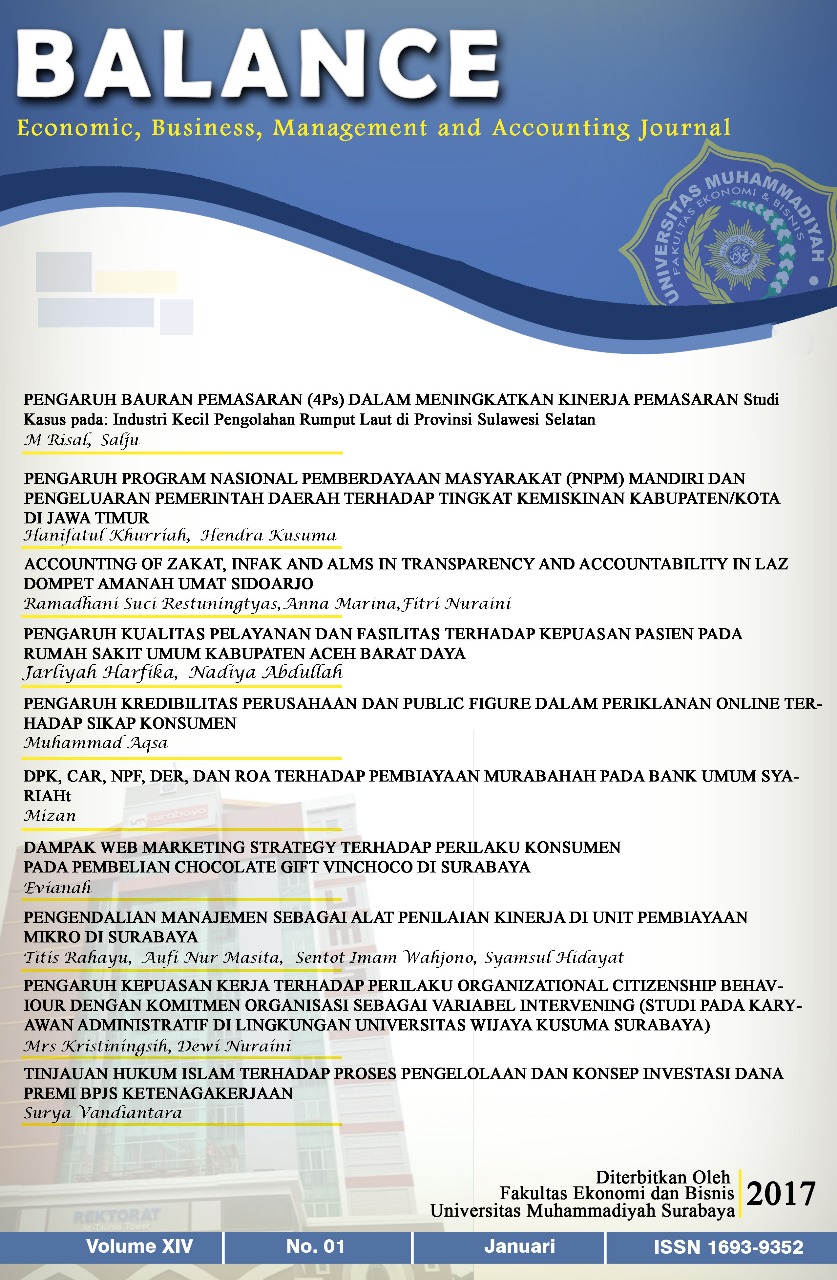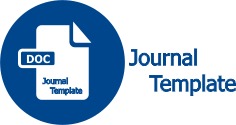AKUNTANSI HIJAU BERBASIS ETIKA BISNIS: IMPLEMENTASI DI RSUA PONOROGO, JAWA TIMUR
DOI:
https://doi.org/10.30651/blc.v14i01.1560Abstrak
ABSTRACT
This study aimed to test whether business ethics has been owned by an organization to guide the implementation of the Green Accounting and Green Accounting for anything that might be implemented in the hospital. This study used a qualitative approach with phenomenological analysis techniques to process the data collected through in-depth interviews, observation as an outsider, and documentation. Source of data derived from key informants consisted of three people management in the field of procurement or purchase of drugs and medical supplies, 3 directors of hospitals and 10 suppliers. With some guided questions, we examined whether the Business Ethics which has been owned by RSUAP able to serve as the basis for implementing the Green Accounting. This study found evidence that Business Ethics capable and very helpful in implementing the Green Accounting. Accounting field that can be implemented for Green Accounting is the procurement / purchase of medicines and medical supplies as well as cost accounting for waste management. The findings of this research could be used to design other accounting fields that can be implemented in line with the concept of the Green Accounting such as investment and marketing decisions.
Keywords : green accounting, Business Ethics, Muhammadiyah hospital.
Correspondence to : a_m_rina@yahoo.com, wahjonos@gmail.com, gitadesip@gmail.com
Referensi
Berry, A Michael dan Dennis A Rondinelli. 1998. Proactive Corporate Environmental Management: A New Industrial Revolution. Academy of Management Executive. 12(2). 38-50.
Choi, J.S. (1999). “An investigation of the initial voluntary environmental disclosures made in Korean semi-annual financial reportâ€. Pacific Accounting Review. Palmerston North, June, Vol. 11, Iss. 1; pp. 73.
Cooper, S. M., dan D. L. Owen. 2007. Corporate social reporting and stakeholder accountability: The missing link, Accounting, Organization, and Society,32, 649-667.
Creswell, John W & Clark, Vicki L.Plano. 2007. Designing and Conducting Mixed Methods Research.. California: Sage Publications, Inc
Ferreira, Clementina. 2004. Environmental accounting: the Portuguese case, Management of Environmental. Vol. 15, No. 6.
Finch, Nigel. 2005. The Motivations for Adopting Sustainability Disclosure.MGSM Working Paper in Management.Macquaire University. Australia.
Irianti, Niar. Yeni Farida, Tia Rizkya, Dilbar Sumadi. 2014. Penerapan Green Accounting bagi Rumah Sakit Sektor Publik dalam rangka mendukung Peran Akuntansi Manajemen. Jurnal Informasi Keuangan dan Akuntansi, Vol. 1 No. 12.
Lindrianasari. 2007. Hubungan antara Kinerja Lingkungan dan Kualitas Pengungkapan Lingkungan dengan Kinerja Ekonomi Perusahaan Indonesia. Jurnal Akuntansi dan Auditing Indonesia, Vol. 11 No. 2 pp. 159-172.
Marina, Anna. Bambang Sugeng, Hari Wahyono, JG Nirbito. 2014. Economic Literacy for the Basis of Organizational Performance Improvement: Evidence from Muhammadiyah Hospital Indonesia. Journal of Asian Scientific Research, Vol. 4 No. 11. pp: 664-676.
Marina, Anna. Wahjono, Sentot Imam. 2013. Business Ethics As A Basis For Designing The Vision And Mission Hospitals: Empirical Evidences From Muhammadiyah Hospital Ponorogo, Indonesia. Journal of Economics, Business and Accounting – Ventura.Vol 16, No 3. Pp 399-408.
Marina, Anna. 2012. Meningkatkan Kinerja Berbasis Nilai-nilai Ekonomi pada Amal Usaha Muhammadiyah bidang Kesehatan. SALAM, Jurnal Studi Masyarakat Islam, Pascasarjana University of Muhammadiyah Malang, Volume 15 Nomor 2 Desember 2012, pp. 171-182.
Marina, Anna. 2011. Akuntansi Keperilakuan berbasis Nilai-nilai Ekonomi untuk meningkatkan Kinerja Rumah Sakit.Jurnal Balance, Thn XI/No.14/January/2011, pp: 29-46.
McHugh, J. 2008. “Accountants have key role in sustainabilityâ€. Public Finance; Dec 14, Academic Research Library.
Musyarofah, Siti. 2013.Analisis Perbedaan Green Accounting di Kota Semarang. Skripsi. Fakultas Ekonomi, Universitas Negeri Semarang.
Puspita, Dyah Aruning. 2015. Carbon Accounting: Apa, Mengapa dan Sudahkah berimplikasi pada Sustainability Reporting? Jurnal JIBEKA, Vol. 9 No. 1. Pp. 29-36.
Shapiro, Karen. Mark Stoughton. Robert Graff. Linda Feng. 2000. Healthy Hospitals: Environmental Improvements Through Environmental Accounting. Boston: Tellus Institute.
Suartana, I Wayan. 2010. Akuntansi Lingkungan dan Triple Bottom Line Accounting: Paradigma Baru Akuntansi Bernilai Tambah. Jurnal Bumi Lestari, Vol. 10 No. 1. Pp. 105-112.
Susilo, Joko. 2008. Green Accounting Di Daerah Istimewa Yogyakarta: Studi Kasus Antara Kabupaten Sleman Dan Kabupaten Bantul. Program D3 Ekonomi Universitas Islam Indonesia
Unduhan
Diterbitkan
Terbitan
Bagian
Lisensi
Hak Cipta
- Hak cipta terhadap artikel yang diterbitkan di BALANCE: Economic, Business, Management, and Accounting Journal adalah penerbit atau BALANCE: Economic, Business, Management, and Accounting Journal.
- Penulis harus menyerahkan hak cipta pada jurnal dengan menandatangai dan mengirimkan form penyerahan hak cipta (template) melalui email balance@um-surabaya.ac.id.
- Penulis dapat menyebarluaskan artikelnya melalui media manapun.
Lisensi
Setiap karya yang ditulis penulis dilisensi dengan Creative Commons Attribution-NonCommercial 4.0 International License.















